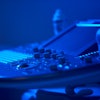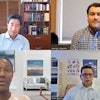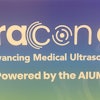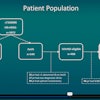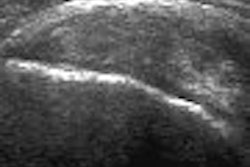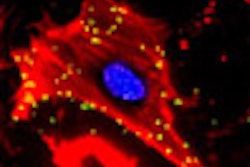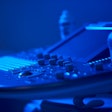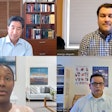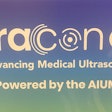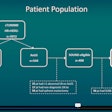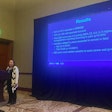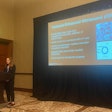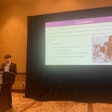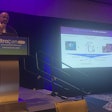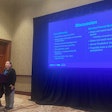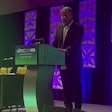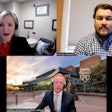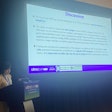A Tucson, AZ, patent management firm has received its third U.S. patent for tissue harmonic imaging (THI), a widely used technology found on many ultrasound scanners. While the company is not detailing its specific plans for defending the patents, it has already licensed the technology to one ultrasound vendor and says it is approaching others about similar deals.
On September 12, Research Corporation Technologies (RCT) received its third U.S. patent (No. 7,104,956) for tissue harmonic imaging (THI) ultrasound technology. The company is managing the patents for the University of Rochester in New York, where researcher Ted Christopher, Ph.D., conducted work on THI in the 1990s at the university's Rochester Center for Biomedical Ultrasound.
Christopher's work culminated in the development of THI, which uses second- and higher-order harmonic responses of tissue to create a much sharper ultrasound image with fewer artifacts than images produced with a fundamental frequency.
For more than 10 years, RCT has been assisting Christopher and the University of Rochester behind the scenes to commercialize THI technology. "We have had a longstanding contractual arrangement with the University of Rochester for dealing with intellectual property," said Eugene Cochran, RCT's director of engineering. Christopher's work with THI "was taken on specifically as a licensing program."
The latest patent approval in September follows two previous U.S. patents for THI: No. 7,004,905, which has broad claims to protect Christopher's discovery; and No. 6,206,833, which covers other aspects of THI technology. RCT has two additional U.S. patent applications pending.
Nonexclusive licenses
Because RCT manages the THI technology for the University of Rochester, the firm is offering nonexclusive licenses under the three patents, as well as other intellectual property. In 2002, RCT granted Mountain View, CA-based ultrasound manufacturer Acuson and its affiliates a nonexclusive license to THI technology. Acuson is part of Siemens Medical Solutions of Malvern, PA.
Cochran declined to discuss RCT's future plans for the THI technology or what action, if any, RCT plans to pursue for vendors who in the past may have sold ultrasound scanners with THI technology. He acknowledged that RCT "is in discussions with numerous companies in the industry" for their use of now-patented THI, but declined to provide more specific information, citing confidentiality.
"Tissue harmonic imaging has significantly improved ultrasound imaging today, and the fees or royalties under the licenses should recognize this value," Cochran added. "We encourage firms to contact us, if they have further interest in or questions about the technology."
RCT has been licensing and patenting novel university technology worldwide since 1987, when RCT spun from its then-parent company. "We then launched the effort where we first were patenting and licensing university technology, but then began to make investment in early stage companies," Cochran said.
In some cases, RCT creates "virtual companies," licensing the intellectual property from the university and making a financial investment to mitigate the technological risk or advance the technology. "We would provide the finance for an idea, patent the technology, and further incubate the technology," he added. "We also help provide some of the management infrastructure and help develop early plans to commercialize the technology."
The company has also not been reticent to protect its patents in other areas: The firm sued computer software giant Microsoft of Redmond, WA, claiming that Microsoft's Windows and Office products infringed on patents RCT held involving the creation of halftones of digital images. Microsoft received decisions in its favor in the case earlier this year and in 2005, with the U.S. District Court for the District of Arizona ruling that RCT's claims were either unenforceable or were invalid.
Start-up opportunities
With almost 20 years' worth of investment in physical and life science technology, RCT has accumulated more than $300 million assets. Today, the company is looking more specifically to invest in start-up opportunities in the pharmaceutical industry, biotechnology, and medical devices.
In the medical device arena, RCT is showing interest in therapeutic technology, rather than diagnostic ventures. "We are interested in the cardiac area, disorders of the spine, and medical devices that are related to gastrointestinal disorders," Cochran said. "We have a strong oncology group here as well."
While RCT has no R&D laboratories to validate novel technologies, the company does offer business managers with technical degrees and a total of more than 40 employees in Tucson and on each coast.
"In a lot of ways, we are very opportunistic, since we are looking at technology at such an early stage," Cochran said. "We troll a lot earlier than typical venture people would look. We are looking at breakthrough technology at a very early stage and trying to move it forward."
By Wayne Forrest
AuntMinnie.com staff writer
October 10, 2005
Related Reading
RCT gets another tissue harmonics patent, September 26, 2006
Kirkpatrick named Research Corporation Technologies CEO, May 26, 2005
RCT licenses tissue harmonic imaging to Acuson, June 3, 2002
Copyright © 2006 AuntMinnie.com
